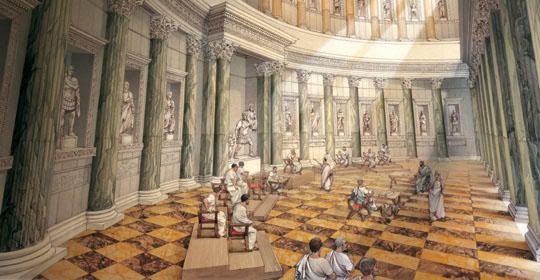
This is an entry in a fun and interesting challenge sponsored by The Ancient World in London, presented by the energetic and classically-minded folks at Heritage Key.
I want to say that virtual edutainment is a lot of fun, but only if it's designed not to be fun but to help learners tell a story—that is, if fun isn't the primary consideration. My thinking on the subject has evolved enormously over the past year, as I've been developing a game-like way of delivering my own courses in classics. This past Fall I gave a course on the Greek historians as a role-playing game; this spring I'm teaching Advanced Latin as an adventure with the poet Ovid in 8 CE Rome.
Because I don't have the resources at my university to develop 3D worlds within which my students can go to ancient Athens and ancient Rome, I've been running my practomimes, as I call them, as old-fashioned tabletop RPG's and as online text-adventure with a few illustrations, like the one above of the Forum of Augustus.
I've learned that the virtual worlds that we create in students' imaginations can be learning tools just as powerful as the immersive environment of an MMORPG. Of course, my students do get to do their share of fighting, since fighting was so crucial to the cultures within which classical literature developed—but the most exciting parts for them have been meeting Pericles, Sophocles, and Augustus, and being able to "see" in their imaginations, what the ancient world looked like.
In Operation KTHMA, the course on Herodotus and Thucydides, my students stood trial for breaking and entering the home of Pericles' rival Thucydides son of Melesias. In FABULA AMORIS ROMANI, my students had to sing for Augustus, first emperor of Rome. In these moments, fun is being had—I have video of some of these moments, and there are actual smiles on my students' faces!—but fun isn't the thing that matters most. What matters is engagement in the material, and, if they're to be believed in their comments on the course at the end of the semester, my students were engaged. In (Gaming) Homer, my students are caught up in an ARG where they must become homeric bards by observing and playing The Lord of the Rings Online in relation to the Iliad and the Odyssey.
How much more wonderful would these courses be if the students could also be there in a 3d rendering? Fun, yes—but if the narrative were well-designed, also a course of study that's just as engaging as World of Warcraft. It's not the fun, it's the immersion, whether that immersion is high-tech, low-tech, or somewhere in between.
